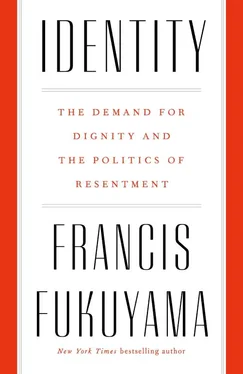Since these events, Ukraine no more than Tunisia has become a successful liberal democracy. Its economy and politics are dominated by a small group of oligarchs, one of whom, Petro Poroshenko, was elected president later in 2014. The government, while democratically elected, is rife with corruption and has been under attack by neighboring Russia, which seized Crimea that same year and started a war in eastern Ukraine. Yet it is important to understand the underlying motives of the political actors who brought about Euromaidan and the Revolution of Dignity.
The uprising was not about democracy, strictly speaking, if by democracy we mean public choice expressed through elections. Yanukovych had been legitimately elected president in 2010, based on support from his Party of Regions. Rather, the fight was over corruption and abuse of power. Yanukovych as president had been able to accumulate billions of dollars of personal wealth, as revelations about his gaudy palace and other holdings were soon to reveal. The Party of Regions received strong support from a shadowy oligarch, Rinat Akhmetov, who controlled most of the large industries in eastern Ukraine. The choice between aligning with the EU or with Putin’s Russia was seen as a choice between living under a modern government that treated people equally qua citizen and living under a regime in which democracy was manipulated by self-dealing kleptocrats behind a veneer of democratic practice. Putin’s Russia represented the epitome of this kind of mafia state; closer association with it rather than Europe represented a step into a world in which real power was held by an unaccountable elite. Hence the belief that the Euromaidan uprising was about securing the basic dignity of ordinary citizens.
The impulses evident in the early stages of the Arab Spring and in the color revolutions point to what is the moral core of modern liberal democracy. Such regimes are based on the twin principles of freedom and equality. Freedom can be understood in a negative sense, as freedom from government power. This is the way that many American conservatives interpret the word: individuals should be allowed to get on with their private lives as they see fit. But freedom typically means more than being left alone by the government: it means human agency, the ability to exercise a share of power through active participation in self-government. This was the sense of agency felt by the crowds in the streets of Tunis or Cairo or Kyiv, who for the first time felt that they could change the way that government power was being used. This freedom is institutionalized in the franchise, which gives every citizen a small share of political power. It is also institutionalized in the rights to free speech and free assembly, which are avenues for political self-expression. Many modern democratic constitutions thus enshrine the principle of equal dignity. They are drawing on the Christian tradition that sees dignity rooted in human moral agency. But that agency is no longer seen in a religious sense, as the ability to accept God; rather, it is the ability to share in the exercise of power as a member of a democratic political community.
In modern liberal democracies, the second principle, equality, has seldom been understood to imply a commitment to substantive economic or social equality. Those socialist regimes that tried to make this a reality soon found themselves running afoul of the first principle of freedom, requiring as they did massive state control over their citizens’ lives. Market economies depend on the individual pursuit of self-interest, which leads to inequalities of wealth, given people’s differing abilities and their conditions of birth. Equality in a modern liberal democracy has always meant something more like an equality of freedom. This means both an equal negative freedom from abusive government power and an equal positive freedom to participate in self-government and economic exchange.
Modern liberal democracies institutionalize these principles of freedom and equality by creating capable states that are nonetheless constrained by a rule of law and democratic accountability. The rule of law limits power by granting citizens certain basic rights—that is, in certain domains such as speech, association, property, and religious belief the state may not restrict individual choice. Rule of law also serves the principle of equality by applying those rules equally to all citizens, including those who hold the highest political offices within the system. Democratic accountability in turn seeks to give all adult citizens an equal share of power by enfranchising them, and allowing them to replace their rulers if they object to their use of power. This is why the rule of law and democratic accountability have typically been tightly intertwined. The law protects both the negative freedom from government abuse and the positive freedom of equal participation, as it did during the civil rights era in the United States. Democratic participation for its part shields the judicial system from abuse. During the English Civil War in the seventeenth century, Parliament rallied to protect the independence of courts, as Polish civil society sought to do in the year 2017, when judicial independence was threatened by the ruling party.
Real-world liberal democracies never fully live up to their underlying ideals of freedom and equality. Rights are often violated; the law never applies equally to the rich and powerful as it does to the poor and weak; citizens, though given the opportunity to participate, frequently choose not to do so. Moreover, intrinsic conflicts exist between the goals of freedom and equality: greater freedom often entails increased inequality, while efforts to equalize outcomes reduce freedom. Successful democracy depends not on optimization of its ideals, but balance: a balance between individual freedom and political equality, and between a capable state exercising legitimate power and the institutions of law and accountability that seek to constrain it. Many democracies try to do a whole lot more than this, through policies that try to promote economic growth, a clean environment, consumer safety, support for science and technology, and the like. But the effective recognition of citizens as equal adults with the capacity to make political choices is a minimal condition for being a liberal democracy.
Authoritarian governments, by contrast, fail to recognize the equal dignity of their citizens. They may pretend to do so through flowery constitutions such as those in China or Iran that list copious citizen rights, but where the reality is different. In relatively benevolent dictatorships, such as those of Lee Kuan Yew in Singapore or China under Deng Xiaoping, the state adopted a paternalistic attitude toward its citizens. Ordinary people were regarded as children who needed protection from a wise parent, the state; they could not be trusted to run their own affairs. In the worst dictatorships, such as those of Stalin and Hitler, large swaths of the population—kulaks (rich peasants), the bourgeoisie, Jews, the disabled, non-Aryans—were regarded as subhuman trash that could be discarded in the name of collective good.
The desire for the state to recognize one’s basic dignity has been at the core of democratic movements since the French Revolution. A state guaranteeing equal political rights was the only rational way to resolve the contradictions that Hegel saw in the relationship between master and slave, where only the master was recognized. This is what drove Americans to protest during the civil rights movement, South Africans to stand up against apartheid, Mohamed Bouazizi to immolate himself, and other protesters to risk their lives in Yangon, Burma, or in the Maidan or Tahrir Square, or in countless other confrontations over the centuries.
Читать дальше












